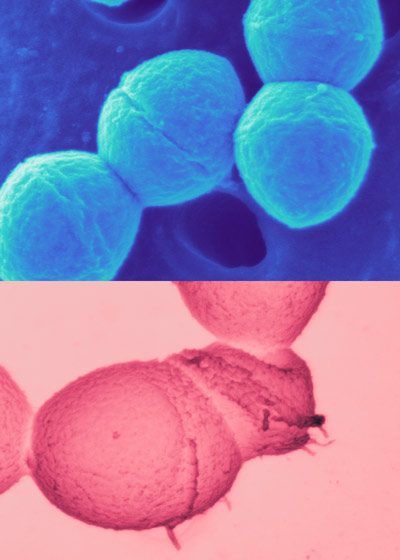 Figure 1: Scanning electron micrographs of drug-resistant bacteria grown in medium without (top) and with (bottom) the secondary bile acid isoalloLCA. The bacteria grown with isoalloLCA exhibit changes to their shapes. © 2021 RIKEN Center for Integrative Medical Sciences
Figure 1: Scanning electron micrographs of drug-resistant bacteria grown in medium without (top) and with (bottom) the secondary bile acid isoalloLCA. The bacteria grown with isoalloLCA exhibit changes to their shapes. © 2021 RIKEN Center for Integrative Medical Sciences
People over 100 years old may owe their longevity in part to having certain species of bacteria in their guts that, via bile acids, help to ward off infections and maintain a healthy gut, a RIKEN-led team has found1. This finding may help to develop diets that enable those bacteria to flourish.
People who live to 100 years old or older are surprisingly robust, often being less susceptible to infections and age-related diseases than many who are decades younger than them. Scientists are eager to discover the causes of this robustness as they could hold the keys to promoting healthy aging.
The community of microorganisms that inhabit our guts has increasingly been shown to play a key role in both preserving health and the development of certain diseases. This led Kenya Honda of the RIKEN Center for Integrative Medical Sciences to speculate whether some species of gut bacteria may be contributing to the longevity of centenarians.
To investigate this, Honda and co-workers analyzed stool samples from three groups of healthy Japanese individuals: young people (average age 31), older people (average age 86) and centenarians (average age 107). The microbiome profiles of the centenarians differed from those of the other two groups in that they contained genes that encoded for bile acids. Analysis of the bile acids of the three groups indicated the centenarians had higher levels of specific secondary bile acids-bile acids that have been modified by bacteria.
Interestingly, the increased levels of secondary bile acids were due to the action of a group of bacteria that hadn't been previously related to secondary bile acids. "Most previous studies on the biosynthetic pathways of secondary bile acids described the role of gram-positive bacteria," says Honda. "So we were surprised and excited to find active metabolism by gram-negative bacteria."
The team found that one of these secondary bile acids exhibited potent effects against harmful gut bacteria that are resistant to multiple drugs (Fig. 1). They suspect that this antibacterial effect imparts centenarians with better defense against infections and also helps keep harmful gut bacteria under control.
The unique make-up of the centenarians' microbiomes is probably partially due to their diets. "Although we didn't investigate the influence of diet, it's highly likely that the centenarians have diets rich in fiber and fermented foods, which affected the microbiota configuration," says Honda. "We hope that advances in microbiome and diet research can address this question in the future."
The team plans to explore two directions. "We want to study the effects of secondary bile acids on the host physiology," says Honda. "We also intend to extend the research to other steroidal compounds."






